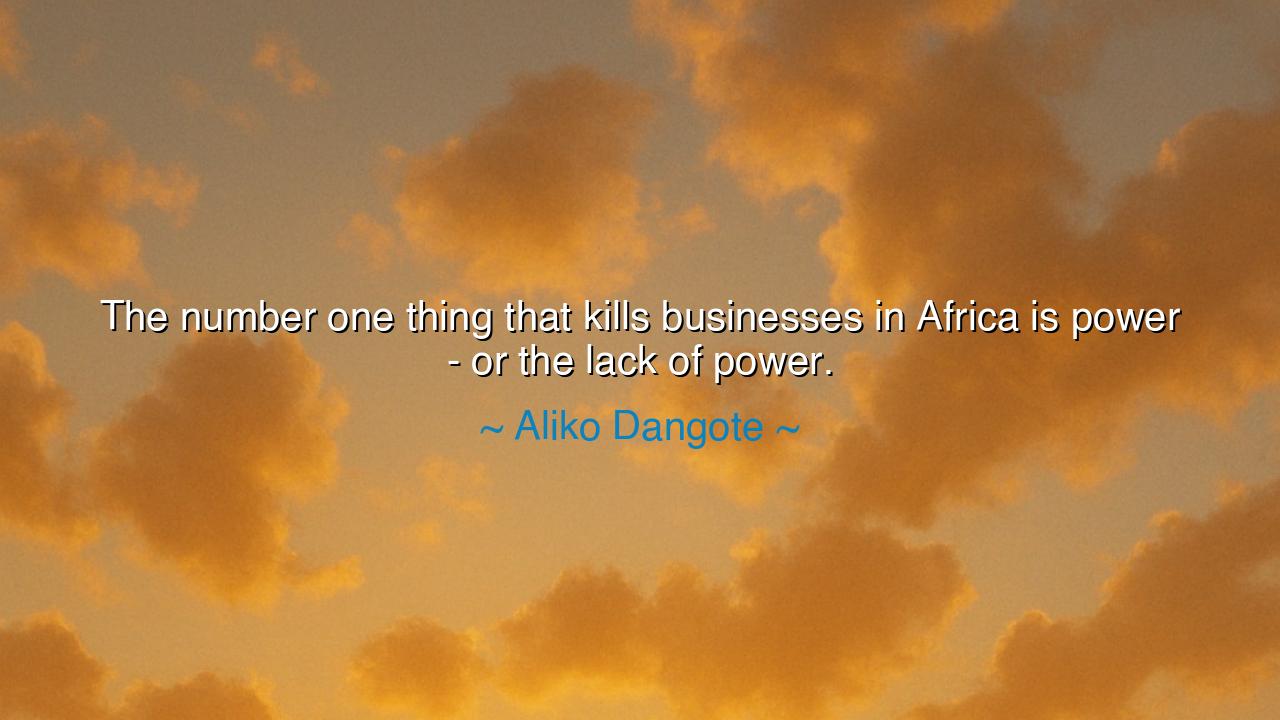
The number one thing that kills businesses in Africa is power -






In the words of Aliko Dangote, “The number one thing that kills businesses in Africa is power—or the lack of power,” we hear not merely the lament of an industrialist, but the voice of truth spoken for a continent. Here, power means more than wealth or influence—it is the force of electricity, the light that fuels machines, the current that sustains enterprise. Without it, ambition falters, and the labor of many hands withers before it bears fruit.
The lack of power is not an abstract complaint, but a daily storm that extinguishes hope. A factory may stand strong, its workers ready, its machines in place—but if the current fails, production halts, wages vanish, and dreams collapse. Dangote, who has built empires in trade and industry, reveals here the great paradox: Africa holds boundless resources and tireless talent, yet without reliable energy, the fire of prosperity flickers in the dark.
History recalls the dawn of the Industrial Revolution in Europe. It was not only the genius of invention but the harnessing of coal, steam, and later electricity that lifted nations into power. Where energy was abundant, progress surged; where it was scarce, stagnation reigned. In the same way, Dangote reminds us that the battle for Africa’s future will not be won by rhetoric alone, but by building the very infrastructure that allows creation to flourish.
His words also bear symbolic weight. For power is both literal and figurative: the electricity that drives factories, and the empowerment of people to shape their own destinies. To deny them reliable energy is to deny them agency, trapping them in dependence and thwarting their potential. To give them power is to unleash innovation, commerce, and dignity.
Thus, let this wisdom be passed on: nations rise not only on courage and vision, but on the foundation of power. Where there is no light, there can be no lasting growth. But where energy flows freely, the spark of enterprise can become a flame that illuminates generations. Dangote’s teaching is clear—if Africa is to rise to its full strength, it must conquer the night and give its people the power to build, create, and endure.






HMNguyen Pham Hong Minh
Dangote’s insight about the lack of power being a major obstacle to businesses in Africa highlights a pressing need for energy infrastructure reform. What are the challenges in addressing power shortages, and what role do both public and private sectors play in overcoming them? Could a shift towards renewable energy sources provide a sustainable solution for businesses looking to thrive in Africa despite current limitations?
LCNguyen Hoang Linh Chi
Aliko Dangote’s focus on power as a key issue for businesses in Africa is eye-opening. How many businesses are forced to shut down or struggle simply because they don’t have consistent access to energy? What long-term solutions can be implemented to ensure stable energy supply across the continent, and how can this issue be prioritized in development strategies to ensure sustainable growth for African economies?
PNPhuong Nguyen
Dangote’s statement brings attention to the critical role power plays in the success of businesses, especially in Africa. The absence of a reliable power supply can have far-reaching consequences. How can the private sector help in addressing these energy gaps, and how important is government policy in creating an environment that supports energy sustainability for businesses? Could partnerships between governments and businesses help solve this issue more effectively?
LGbao tran luong gia
Aliko Dangote’s observation about the lack of power affecting African businesses raises an interesting issue. How much of Africa’s business potential is held back by these infrastructure challenges? What kind of systemic changes could be implemented to improve power supply and boost economic growth? How do we balance the need for energy solutions with the rapid growth of the business sector in Africa?
NBNy Bao
Dangote’s point about power being the primary barrier to business growth in Africa is powerful. It highlights a practical challenge that many businesses face in regions where infrastructure is lacking. How do you think improving access to stable electricity would change the economic landscape of African countries? Could this be the key to unlocking more opportunities for entrepreneurs and fostering growth in key industries?